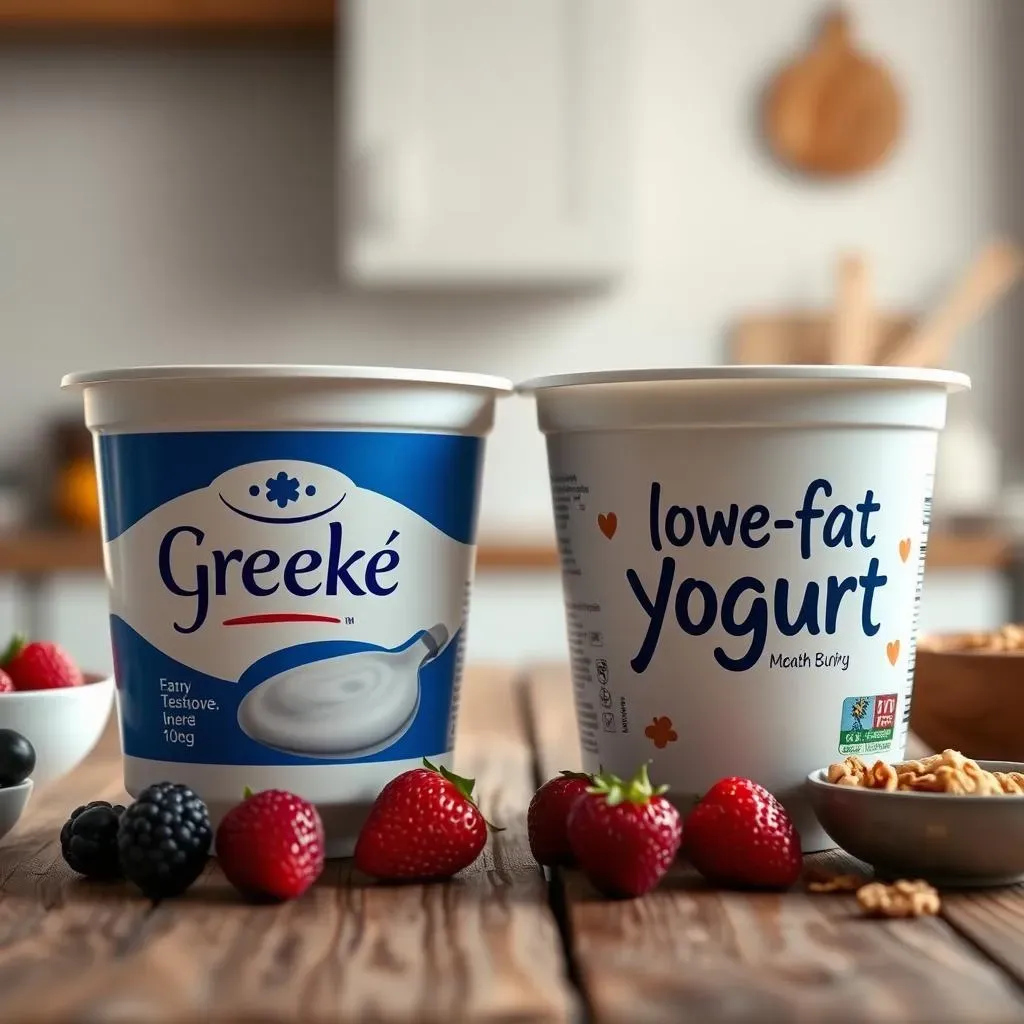Table of Contents
Walk down the yogurt aisle these days, and you're hit with choices. Greek, low fat, flavored, plain – it's enough to make your head spin. But if you're trying to make a healthy choice, you're probably wondering: is low fat yogurt or greek yogurt the better option? Greek yogurt has surged in popularity, touted for its high protein content and creamy texture. But does that automatically make it superior to its low fat counterpart? Maybe you're watching your fat intake, so low fat yogurt seems like the obvious winner. But is it really that simple? This article is here to cut through the confusion. We'll break down the key differences between Greek and low fat yogurt, diving into their nutritional profiles, health benefits, and potential drawbacks. We'll explore how each type is made, what nutrients they pack, and how they can fit into a balanced diet. By the end, you'll have the knowledge you need to confidently choose the best yogurt for your individual needs and health goals. Get ready to ditch the guesswork and make an informed decision about your next yogurt purchase!
Greek Yogurt vs. Low Fat Yogurt: Unveiling the Key Differences

Greek Yogurt vs. Low Fat Yogurt: Unveiling the Key Differences
The Straining Story: How They're Made
so both Greek yogurt and low fat yogurt start out as regular yogurt, right? But here's where things get interesting. Greek yogurt goes through an extra straining process. Think of it like this: regular yogurt is like a regular cup of coffee, and Greek yogurt is like a shot of espresso. They both start with the same base, but Greek yogurt has had more of the liquid (whey) removed.
This straining is what gives Greek yogurt its signature thick, creamy texture. It also concentrates the protein and reduces the amount of lactose, which is the naturally occurring sugar in milk. That's why Greek yogurt often has a slightly tangier taste than regular yogurt. Low fat yogurt, on the other hand, is typically made with skim milk and doesn't undergo the same intense straining process. It retains more of the whey and lactose, resulting in a thinner consistency and a sweeter flavor.
Texture and Taste: A Sensory Showdown
Let's talk about what really matters: how they feel in your mouth and what they taste like! Greek yogurt, thanks to that extra straining, boasts a thick, almost luxurious texture. It's the kind of yogurt that stands up on your spoon. The taste is often described as tangy, slightly sour, and less sweet than regular yogurt. This makes it a great base for both sweet and savory dishes.
Low fat yogurt is usually smoother and thinner, almost pourable. Because it retains more of the natural sugars from the milk (lactose), it tends to be sweeter. This can make it appealing if you prefer a milder flavor, but it also means you might be getting more sugar than you bargained for. It's also worth noting that many low fat yogurts have added sugars to compensate for the lack of fat, so always check the label!
Fat Content: The Obvious Difference (or is it?)
The most obvious difference, as the name suggests, is the fat content. Low fat yogurt is made with skim milk, so it has very little fat. This can be appealing if you're watching your calorie intake or trying to limit your fat consumption. However, it's important to remember that not all fats are created equal. The fat found in dairy products, including yogurt, can actually be beneficial for your health.
Greek yogurt, while often available in nonfat and low fat versions, also comes in full-fat options. Full-fat Greek yogurt contains more calories, but it also provides a richer flavor and a greater sense of satiety. Plus, some studies suggest that full-fat dairy products may not be as detrimental to your health as previously thought. The key is to consider your overall diet and lifestyle when choosing between low fat and full-fat options.
Characteristic | Greek Yogurt | Low Fat Yogurt |
|---|---|---|
Texture | Thick, creamy | Smooth, thin |
Taste | Tangy, less sweet | Sweeter |
Fat Content | Available in nonfat, low fat, and full-fat | Low fat (made with skim milk) |
Protein | Higher | Lower |
Sugar | Lower | Higher (often with added sugars) |
Low Fat Yogurt or Greek Yogurt: Decoding the Nutritional Showdown

Low Fat Yogurt or Greek Yogurt: Decoding the Nutritional Showdown
Alright, let's get down to the nitty-gritty: what's actually in these yogurts? When it comes to low fat yogurt or Greek yogurt, the nutritional profiles can vary quite a bit. We're talking protein, carbs, fat (obviously!), and those all-important micronutrients. It's not just about calories; it's about the quality of those calories and how they contribute to your overall health. Think of it like comparing a sports car to a fuel-efficient sedan. Both get you from point A to point B, but their engines and performance are totally different. Let's see what fuels these yogurts.
Protein Power: The Muscle-Building Champion
Protein is where Greek yogurt really shines. That extra straining process concentrates the protein, making it a fantastic source for muscle building, satiety, and overall health. We're talking often double the protein of regular low fat yogurt in a similar serving size. If you're active, trying to lose weight, or simply want to feel fuller for longer, Greek yogurt is your protein-packed pal. Low fat yogurt still provides protein, but it's generally a smaller dose. It's like comparing a protein shake to a small handful of nuts – both contain protein, but one packs a much bigger punch.
Carbs and Sugar: The Sweet Truth
Here's where things get a little tricky. Naturally, yogurt contains lactose, a milk sugar. Greek yogurt generally has less lactose than low fat yogurt due to the straining process. However, many low fat yogurts have added sugars to improve their taste and texture. This can lead to a higher overall sugar content, even if the yogurt is low in fat. Always check the nutrition label for added sugars like sucrose, fructose, or high-fructose corn syrup. Remember, hidden sugars can sneak into even the healthiest-sounding foods!
Fat Content: Quality vs. Quantity
As the name suggests, low fat yogurt is lower in fat than full-fat Greek yogurt. But as we've touched on, not all fats are created equal. The fat in dairy products can be a source of beneficial fatty acids. Plus, fat helps you absorb certain vitamins and minerals. If you're strictly watching your fat intake, low fat yogurt might be the way to go. But if you're not afraid of healthy fats, full-fat Greek yogurt can be a satisfying and nutritious option. It's like choosing between a salad with light vinaigrette and a salad with avocado – both can be healthy, but they offer different nutritional benefits.
Micronutrients: Vitamins and Minerals
Both Greek yogurt and low fat yogurt are good sources of calcium, which is essential for bone health. They also contain other important micronutrients like vitamin D, potassium, and B vitamins. The specific amounts can vary depending on the brand and type of yogurt, so it's always a good idea to compare nutrition labels. Think of these micronutrients as the supporting cast in the yogurt's nutritional drama – they might not be the stars, but they play a vital role in keeping you healthy and strong.
Nutrient | Greek Yogurt (per 6oz serving) | Low Fat Yogurt (per 6oz serving) | Notes |
|---|---|---|---|
Calories | 100-150 | 80-120 | Varies depending on fat content and brand |
Protein | 15-20g | 8-12g | Greek yogurt is significantly higher in protein |
Fat | 0-8g | 0-3g | Varies depending on fat content |
Carbohydrates | 5-10g | 10-15g | Greek yogurt is generally lower in carbs |
Sugar | 5-8g | 8-12g (often with added sugars) | Check for added sugars in low fat yogurt |
Calcium | 15-20% DV | 10-15% DV | Both are good sources of calcium |
Health Benefits FaceOff: Low Fat Yogurt and Greek Yogurt

Health Benefits FaceOff: Low Fat Yogurt and Greek Yogurt
so we've looked at the nitty-gritty of what's in each yogurt, but what does that actually mean for your body? When it comes to low fat yogurt and Greek yogurt, both offer a range of health benefits, but they shine in different areas. It's like comparing a marathon runner to a weightlifter – both are athletes, but they excel in different types of physical activity. Let's break down the specific health perks each yogurt brings to the table, from gut health to weight management and beyond.
Gut Health: Probiotics to the Rescue
Both Greek yogurt and low fat yogurt are fermented foods, which means they contain probiotics – those beneficial bacteria that live in your gut and promote a healthy digestive system. Probiotics can help improve digestion, boost your immune system, and even improve your mood. However, not all yogurts are created equal when it comes to probiotics. Look for yogurts that have "live and active cultures" listed on the label to ensure you're getting a good dose of those gut-friendly bacteria. It's like planting a garden in your gut – you need the right seeds (probiotics) to help it flourish!
Weight Management: Feeling Full and Satisfied
Here's where Greek yogurt's high protein content really shines. Protein is incredibly satiating, meaning it helps you feel fuller for longer. This can be a huge benefit for weight management, as it can help you reduce your overall calorie intake by curbing cravings and preventing overeating. Low fat yogurt can also contribute to weight management, but it may not be as effective as Greek yogurt due to its lower protein content. It's like choosing between a filling salad with grilled chicken and a lighter salad with just lettuce and dressing – both are healthy options, but one will keep you satisfied for longer.
Bone Health: Calcium for Strong Bones
Both Greek yogurt and low fat yogurt are excellent sources of calcium, which is essential for maintaining strong bones and preventing osteoporosis. Calcium is especially important for women and older adults, who are at a higher risk of bone loss. Getting enough calcium in your diet can help keep your bones healthy and strong for years to come. It's like building a house – you need a strong foundation (calcium) to ensure it can withstand the test of time.
Other Potential Benefits: A Wide Range of Perks
Beyond gut health, weight management, and bone health, both Greek yogurt and low fat yogurt offer a range of other potential benefits. Some studies suggest that yogurt consumption may be linked to a lower risk of type 2 diabetes, heart disease, and certain types of cancer. However, more research is needed to confirm these findings. It's like exploring a new continent – we've only scratched the surface of what these yogurts can do for our health!
Health Benefit | Greek Yogurt | Low Fat Yogurt | Notes |
|---|---|---|---|
Gut Health | Good source of probiotics | Good source of probiotics | Look for "live and active cultures" on the label |
Weight Management | High protein promotes satiety | Lower protein, may not be as satiating | Consider protein content for weight loss |
Bone Health | Excellent source of calcium | Excellent source of calcium | Important for strong bones |
Other Potential Benefits | May be linked to lower risk of certain diseases | May be linked to lower risk of certain diseases | More research is needed |
Making the Right Choice: Choosing Between Low Fat Yogurt and Greek Yogurt for Your Needs

Making the Right Choice: Choosing Between Low Fat Yogurt and Greek Yogurt for Your Needs
Assess Your Dietary Needs and Goals
so you've got all the info on low fat yogurt and Greek yogurt, but how do you actually decide which one's right for you? It all boils down to your individual needs and goals. Are you trying to lose weight? Build muscle? Improve your gut health? Or are you simply looking for a healthy and delicious snack? Once you've identified your priorities, you can start to narrow down your options. Think of it like choosing a car – you wouldn't buy a sports car if you needed a minivan for your family, right? The same principle applies to yogurt!
Consider your overall diet and lifestyle. Are you already getting plenty of protein from other sources? Do you have a sweet tooth that needs to be satisfied? Are you sensitive to lactose? These factors can all influence your choice. For example, if you're a vegetarian who struggles to get enough protein, Greek yogurt can be a fantastic addition to your diet. On the other hand, if you're watching your sugar intake, you might want to opt for plain Greek yogurt or low fat yogurt with no added sugars. It's all about finding the right fit for your unique needs.
Consider Taste Preferences and Versatility
Let's be real – even the healthiest food isn't worth eating if you don't enjoy it! Taste is a crucial factor when choosing between low fat yogurt and Greek yogurt. Do you prefer the tangy, slightly sour flavor of Greek yogurt, or the sweeter, milder taste of low fat yogurt? Think about how you plan to use the yogurt. Greek yogurt's thick texture makes it ideal for dips, sauces, and smoothies. Low fat yogurt, with its smoother consistency, is great for parfaits, toppings, and baking. Both can be enjoyed plain or with added fruits, nuts, or granola.
Don't be afraid to experiment with different brands and flavors to find what you like best. Some brands of Greek yogurt are tangier than others, while some low fat yogurts have a more artificial taste. Read the labels carefully and look for yogurts with simple, natural ingredients. Ultimately, the best yogurt is the one that you'll actually look forward to eating! It's like finding your favorite workout – if you enjoy it, you're more likely to stick with it.
Factor | Questions to Ask Yourself |
|---|---|
Dietary Goals | Am I trying to lose weight, build muscle, or improve my overall health? |
Taste Preferences | Do I prefer tangy or sweet flavors? |
Versatility | How do I plan to use the yogurt (e.g., smoothies, dips, toppings)? |
Lactose Sensitivity | Am I sensitive to lactose? |
Added Sugars | Am I concerned about added sugars? |
The Verdict: Choosing the Right Yogurt for You
Ultimately, the choice between low fat yogurt and Greek yogurt boils down to your individual dietary needs and preferences. If you're prioritizing protein and satiety, Greek yogurt is the clear winner. However, if you're strictly watching your fat intake or prefer a milder flavor, low fat yogurt can still be a healthy and delicious option. Remember to always check the nutrition labels and be mindful of added sugars, regardless of which type you choose. Incorporate either into a balanced diet, and you're on the right track!
